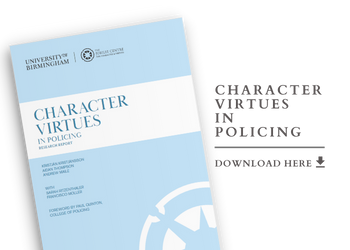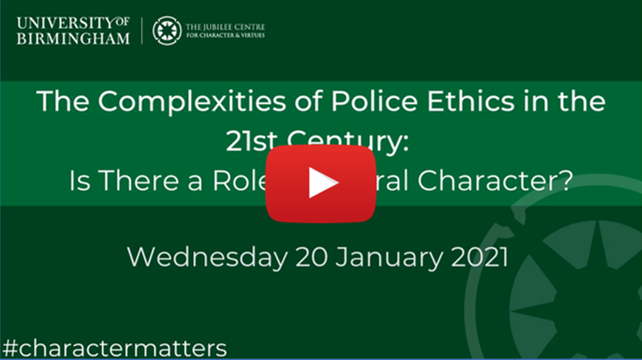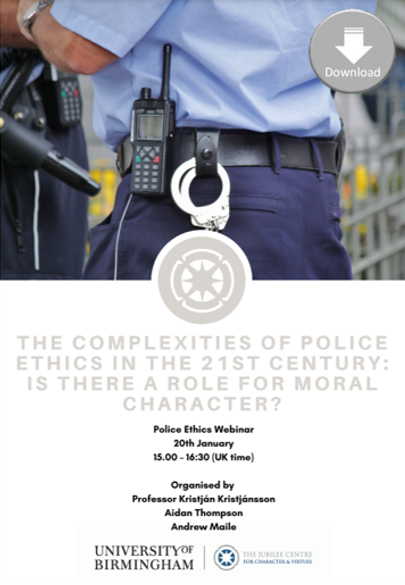Project Overview
The Character Virtues in Policing research report was published on 15th September 2021. Drawing on insights from mixed-method research with pre- and in-service police officers from forces and universities throughout the U.K.
The project aimed to understand the moral character that sits behind the human agency, rather than solely concentrating upon the structure and culture which shapes police practice. The project has sought to capture pre-service and in-service police officers’ ideas about the character qualities that are most important to them as professionals, those they see as exemplifying the ‘ideal’ police officer, and how they respond to bespoke policing-specific moral quandaries.

Summary of Key Findings
- The most frequently selected ‘ideal’ character strength across all three cohorts was honesty. Honesty was also the top-ranked self-ascribed personal character strength for cohorts 2 and 3. However, for cohort 1, the moral virtue of fairness was top-ranked.
- The main motivation for the participants to pursue a career in policing was a desire to help and serve within the community.
- The dominant form of moral reasoning in dealing with work-related moral dilemmas was deontological (rule-based), which was further elaborated in interviews where many police officers categorised themselves as ‘enforcers of the law’. The second most frequently selected reasoning strategy was virtue ethical. The preponderance of deontological reasoning sets police participants apart from all professionals studied previously by the Jubilee Centre, apart from nurses.
- Police officers felt that the work they do is useful, and that they are able to do the right thing when at work. Officers also indicated that they were mostly able to remain true to their personal values, and to a greater extent than for other professions studied by the Jubilee Centre (2012-2020).
- However, one of the main challenges for the officers was that they felt unable to perform their work to the standard that they would like to, attributed to a lack of resources, which impacted on how much time can be spent on individual cases. This was a factor that was identified as causing stress: a major complaint in this study.
- Various factors related to professional purpose, when taken together from the survey, indicated that police officers (cohort 3) had a lower sense of professional purpose than any other U.K. profession studied so far, apart from lawyers. However, this finding was not borne out in the interviews.
Summary of Key Recommendations
- Virtue ethics needs foregrounding more in professional ethics education within police-science and CPD courses. In general, more attention needs to be paid to the moral and characterological grounding of policing and to establishing a clearer sense of the ideal ‘policing by consent’.
- The police Code of Ethics needs to be revised to reflect more explicitly virtue ethical considerations, not least the ideal of metacognitive professional phronesis.
- Serious effort must be made to re-establish a sense of professional purpose among established police officers.
- The Code should be embedded more explicitly throughout practical and theoretical courses in police education, and practical guidance should be offered by the College of Policing to universities along the lines of an axiological framework that emphasises the moral nature of policing.
Teaching Phronesis to Aspiring Police Officers
 Teaching Phronesis to Aspiring Police Officers report was published on 20th September 2022. This report is on a pilot study of a phronesis-focussed teaching intervention with police science students at five universities in England and Wales. The intervention took the form of four 45-minute classes, measured via pre-and post-intervention surveys using a validated measure of phronesis. The report explores what worked and did not work in a phronesis classroom intervention with police science student participants; what can be inferred from the administration of a phronesis measure (pre- and post-) about the students completing and not completing it; and what lessons can be learned from interviews with lecturers about the strengths and weaknesses of the intervention.
Teaching Phronesis to Aspiring Police Officers report was published on 20th September 2022. This report is on a pilot study of a phronesis-focussed teaching intervention with police science students at five universities in England and Wales. The intervention took the form of four 45-minute classes, measured via pre-and post-intervention surveys using a validated measure of phronesis. The report explores what worked and did not work in a phronesis classroom intervention with police science student participants; what can be inferred from the administration of a phronesis measure (pre- and post-) about the students completing and not completing it; and what lessons can be learned from interviews with lecturers about the strengths and weaknesses of the intervention.
Summary of Key Findings
- There was great variability in students studying policing in the U.K. This made felicitously pitching a single intervention at all of them difficult.
- Some of this inter-university-course difference was caused by varying personality profiles of students, rather than different levels of phronesis.
- Those students most motivated to pursue the phronesis intervention (as judged by their willingness to complete an in-depth post-survey) scored significantly higher on measures of (i) the virtue aspect of the Contingencies of Self-Worth measure, and (ii) Moral Self-Relevance. Hence, sustained participation in the intervention was already predicted by some of the components that the intervention was meant to improve.
- The ‘motivated students’ also scored higher in perspective taking, empathic concern, pro-sociality, conscientiousness, extraversion and, most of all, agreeableness.
- Interviews with lectures revealed overall satisfaction with the general suitability of the intervention and its relevance for use with students on all police science courses.
- However, the language in which the intervention was couched was deemed’ too academic’ for a considerable portion of the students.
- A need was identified to build the confidence levels of students when discussing complex police dilemmas in a reflective and deliberative way.
- The closer a phronesis intervention was connected to already existing themes (such as learning about the Code of Ethics [the Code] and the National Decision Model [NDM]), the more likely it was that participants found it relevant. However, unnecessary repetitions must also be avoided.
Summary of Key Recommendations
- It was clear that student cohorts pursuing policing at different universities had different baseline characteristics; and this must be taken account of in future design of interventions. No ‘one size fits all’ intervention will work across the different educational contexts.
- Before a phronesis intervention is carried out again with policing students (or with serving police officers), an effort must be made to improve the confidence levels of the participants in discussing complicated dilemmas. A sufficient motivational level (e.g., making phronesis relevant to the individual) must be secured by relating the content even closer to existing teachings on the Code.
- Any revised intervention must be couched in language that is grounded and comprehensible and does not presuppose competence in the use of abstract academic concepts.
Police Ethics Webinar & Papers
As part of the Virtues in Policing project, the Centre hosted a police ethics webinar, ‘The Complexities of Police Ethics in the 21st Century: Is There a Role for Moral Character?’, with experts in the fields of policing, policing ethics and police education in the UK.
You can view the webinar below:

During the webinar, the authors presented position papers on the role of character and virtues in current police education and practice, the changing nature of policing in the 21st century, and the value and purpose of ethical dilemmas.
You can view the collection of papers below:

Publications
Insight Papers
Police History, Police Education in England and Wales, and the Limited Role of Professional Ethics – Andrew Maile
Police Ethics Webinar & Papers
As part of the Virtues in Policing project, the Centre hosted a police ethics webinar, ‘The Complexities of Police Ethics in the 21st Century: Is There a Role for Moral Character?’, with experts in the fields of policing, policing ethics and police education in the UK.
You can view the webinar below:

During the webinar, the authors presented position papers on the role of character and virtues in current police education and practice, the changing nature of policing in the 21st century, and the value and purpose of ethical dilemmas.
You can view the collection of papers below:

